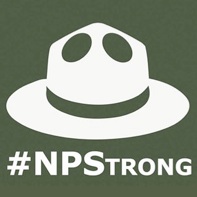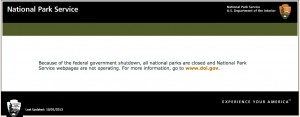Locked out, not shut down
09 October 2013 – Heather Huyck
I didn’t expect this shut down to bring back the 1995 shut down so vividly; that lock out was almost twenty years ago! But talking with friends and colleagues, I hear the same deep sense of unworthiness, of uncertainty, of being sent like a naughty child to my room but with all the work still piling up—and the deadlines remaining fixed. It feels dank.
We need to call this Shut Down the Lock Out it is—the effort to “prove” that government employees are either needed or extraneous, that they are either part of our security/military function or rightfully belonging to that dustbin of social causes. I strenuously disagree with the effort—and hope that as this Lock Out progresses the American people will see all the many ways that various parts of the federal government improve and protect their lives.
I certainly don’t agree with everything “the” government does. In fact, I always jump when I hear anything cast as the government, the academy, the profession, the church, the whatever because then I know that great complexity is being pounded down into over-simplicity, usually from ignorance and always for political gain of some kind. It’s really a wild collection of different organizations sometimes cooperating, often competing, usually under-resourced and charged with managing a very complex operation—the US government.
I remember hearing a story that during the Korean War, some US soldiers, not sure why they were fighting, cast their sick fellow soldiers out of their tents to freeze. They supposedly acted because they wanted to avoid fouling their own rest and because they themselves didn’t know why they were fighting. I’m not sure I believe this story, but it has long haunted me as a story: that if we don’t know why we’re doing something, we can easily do awful things. If we don’t know what we are as a country and we don’t share values of common caring, we’ll then cast each other out into the cold.
As historians, we can both comfort and warn other people. There have been such crises before, and we got through them. But the damage done by such crises as lock outs is often hidden but surely long lasting and powerful. I remember being at our kitchen table in 1995, feeling that the hard work my husband and I were doing for the National Park Service was completely not-valued. We wondered why we were working so hard? Why was I getting up so early and working so late? Who cared? And, would we be paid? I felt someone was taking advantage of all of us.
But I knew in my heart of hearts that what we did was important, whether the US Congress recognized it or not. What we did made a difference to the American people and even the world. Public recognition was not what we’d sought, but we had the quiet knowledge of serving our country and doing things that mattered. And as my parents told my sister and me (when they weren’t holding our father’s security clearance over our heads to keep us thoroughly in line), as government employees, we didn’t have to spend our lives advertising one single brand of soap.
Yesterday I met a woman at my local Target. Both of her parents are locked out. They are worried about being able to make their mortgage payment this month, and she is the only one in the family working. How can they make a mortgage payment on her salary? How can we encourage the “best and brightest” to work for the US Government when these things happen? Never mind that lock outs and shut downs, lock outs and mass firings of various kinds happen elsewhere—we somehow believe, contrary to the history, that they should not happen here.
 I worked on Capitol Hill for many years and remain privately proud of the work I accomplished there, the parks established, the policies developed, the people helped. The Chairman of the National Parks and Public Lands Subcommittee, Bruce Vento, valued my expertise as a historian even if it often felt to me like a constant final oral examination with extremely high expectations. That approach, though, works much better than having your email, phones, and Websites suspended amidst uncertainty, plus waiting for more disrespect, which is what many federal employees are experiencing now. But, I am happy to share that one frustrated ranger, whose action has rallied many of us of the gray and green, has created a Twitter account, #NPStrong.
I worked on Capitol Hill for many years and remain privately proud of the work I accomplished there, the parks established, the policies developed, the people helped. The Chairman of the National Parks and Public Lands Subcommittee, Bruce Vento, valued my expertise as a historian even if it often felt to me like a constant final oral examination with extremely high expectations. That approach, though, works much better than having your email, phones, and Websites suspended amidst uncertainty, plus waiting for more disrespect, which is what many federal employees are experiencing now. But, I am happy to share that one frustrated ranger, whose action has rallied many of us of the gray and green, has created a Twitter account, #NPStrong.
My personal “favorite” action in this 2013 Lock Out? It’s probably the dishonor towards federal employees from those people who voted to lock up the parks and then complain that World War II veterans should be allowed to visit the memorial in Washington, DC. This is memorial “cherry picking” – what about all the other parks, the other offices, the less visible functions that it takes to keep this nation going?
So please, call your federal friends—tell them you greatly value them and their work. Reassure them that they matter. Get them out of their houses (even if they have decided to clean their kitchen floors, catalog all their books, or catch up on sleep, all strategies I’ve seen). Feed them some Target Triple Chocolate Gelato and feed their hearts and souls as well—we need them, and right now, they need us.
~ Heather Huyck worked for the National Park Service and for the House of Representatives Subcommittee on National Parks and Public Lands; she has visited 321 parks.





It may not feel like it to you right now, but please be assured that there are many non-NPS people who know and appreciate the valuable work that you and other NPS personnel do. We just don’t make the kind of news stories that the media seem to be looking for, especially right now. I think you have the right idea in terming this a lockout. Thank you and everyone else at the National Park Service for all that you do in the face of chronic underfunding even when there isn’t a shutdown.
I 100% agree with your points on the value of the work undertaken by agencies like the NPS (which seems to be unappreciated at times) and the challenge of attracting quality workers to the U.S. Government. Just don’t forget to mention the many other agencies and federal employees – with the BLM, BOR, BIA, FS, etc. – who work every day to protect our nation’s cultural resources and history.
yes, there are many people who do great work for our country, and its cultural resources– as a former NPS employee, I’m reflecting my perspective and thank you for reminding us all about all the other great people working out there. Please reach out to them as well. Flowers, calls and chocolate are all appreciated by them. Cheers, Heather
Interesting Post. As a retired 30 year Civil Sevant for a nameless Taxing Authority, I generally agree with your postings. But….
My agency gets a lot of bad publicity, some desrved, some undeserved, most somewhere in the middle.
The public unfortunately equates government service too often with the illegal actions and condescending attitude of a senior official that was seen on Congressional Hearings regarding harassment of political groups.earlier this year. For arguments sake let’s call her “Lois”.
The harm that bureaucrats like Lois, the extrra harassment done to seniors and foreign visitors at Yellowstone, the closing of public roads to get to and access private property in the National Parks, the policy of closing the great open air parks to the public including 90 Year Old vets in wheel chairs (accompanied by Park Ranger comments that (Civil SERVANTS) they were told to make life as “difficult as possible” for the Public) and deriving fallen soldiers of death benefits for themselves and their family, is devestating to the majority of government workers.
With horror stories like this, is it any wonder that the perception of government is so bad?
In any orgaization the tone is set at the top.
Yes I can believe the evidence that our Civil Servants were told to make life as difficult as possible for the Public.
As was said in the Godfather, “A fish rots from the top.”.